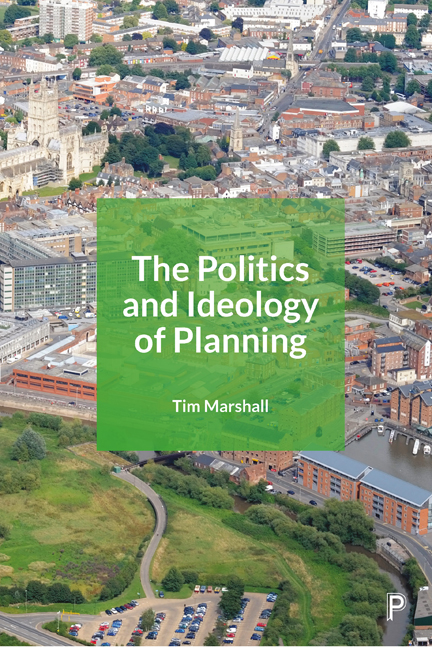Book contents
- Frontmatter
- Contents
- List of figures and tables
- List of abbreviations
- Acknowledgements
- 1 Introducing planning, politics and ideology
- 2 Writing on politics and ideology in planning
- 3 Ideologies in Britain, with initial linking to planning
- 4 Planning history, planning reform and politics and ideology
- 5 Planning expertise and planning law: autonomy from politics and ideology?
- 6 Ideology and politics in government, central and local
- 7 Ideology and politics in professions, lobbying, consultancies and pressure groups
- 8 Communication, the media and deliberation
- 9 Facets of planning action: heritage, local environment and design
- 10 Fields of planning action: housing, economy and infrastructure
- 11 Paths to improving the ideological and political dimensions of planning
- References
- Index
5 - Planning expertise and planning law: autonomy from politics and ideology?
Published online by Cambridge University Press: 05 January 2022
- Frontmatter
- Contents
- List of figures and tables
- List of abbreviations
- Acknowledgements
- 1 Introducing planning, politics and ideology
- 2 Writing on politics and ideology in planning
- 3 Ideologies in Britain, with initial linking to planning
- 4 Planning history, planning reform and politics and ideology
- 5 Planning expertise and planning law: autonomy from politics and ideology?
- 6 Ideology and politics in government, central and local
- 7 Ideology and politics in professions, lobbying, consultancies and pressure groups
- 8 Communication, the media and deliberation
- 9 Facets of planning action: heritage, local environment and design
- 10 Fields of planning action: housing, economy and infrastructure
- 11 Paths to improving the ideological and political dimensions of planning
- References
- Index
Summary
This chapter is about the ‘other side’ of the argument – how planning is certainly not all politics and ideology. The chapter examines how two important aspects of planning practice affect the relationship to politics and ideology. These aspects are the use of technical skills and expertise, and the strong foundations in legal processes. We are therefore going here into the ‘instrumentation’ of planning, the many tools and procedures and knowledges used in the art of planning. Further important aspects of this instrumentation relate to planning's organisational location, for example how far it may be seen as a bureaucratic function, and how it relates to the world of pressure politics. These, though, are major areas in their own right and will be the subjects of Chapters 6 and 7.
One question at issue here is how far planning can be seen as autonomous. To argue that it is strongly so would, to a degree, go against my stress on politics and ideology. The chapter therefore considers this, with one conclusion being that planning certainly involves much beside politics and ideology, but even these parts are not so very politics and ideology free. There is of course much that is not directly ideological in planning – for example, spatiality, the force of material objects, the power of ‘purely’ self-interested behaviour, if such a thing can be abstracted. There is not space to discuss the extent of politicisation or ideologisation of all these aspects. But the matters discussed in this chapter are perhaps especially important in grasping the nature of planning.
This chapter does therefore belong in the ‘political and ideological dimensions of planning’ box of Chapter 1, even though the topics are not at all fully consumed by these. I start with the issues of skills and expertise, before tackling the weighty and, in my view, much less effectively discussed issue of planning's links to the law.
Technical and knowledge dimensions
To those working as planners, it is clear that there is an extensive base of knowledge, technique and experience which underlies this work, just as it underlies any skilled activity. Some academic critics have been less sure of this, citing a much weaker technical base than in some professions, normally citing law, medicine or engineering as being ‘real professions’ in comparison (Reade 1987, Evans 1993).
- Type
- Chapter
- Information
- The Politics and Ideology of Planning , pp. 81 - 100Publisher: Bristol University PressPrint publication year: 2020



